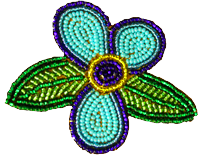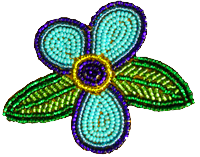Dorothy Smith
A member of the Wolf Clan 
Dorothy remembers her early childhood as being very active and happy. Her dad built a cabin for her to be born in at Pelly Banks. They stayed there until the trading post closed in 1946. After that, her early years were spent going into the bush from Pelly Lakes. Traditional activities like hunting, trapping, fishing gathering berries and medicines kept everyone busy in all seasons. They would travel all over; Fish Lake, Jackfish Lake, Summit Lake. Life with her mother, Mary Charlie and father, Joe Charlie, was simple and everyone was happy. Christmas was a special time for the family, with a nice dinner. This happy, active and traditional family centered life was soon to change however.
In 1949 Dorothy's sister, Grace, was taken away on a plane to residential school. One day she was there, the next day she was gone. This was very hard for everyone because they were always together, a family. The next year Dorothy was taken away too. The plane took her and other Kaska children, and dropped them off to be loaded into the back of an old army truck with a canvas cover. In this way they would travel hundreds of kilometers to the residential school at the Whitehorse Indian Baptist Mission School. As she recalls, “There were lots of kids in the back of the truck and everybody cried until we went to sleep. Then we cried when we woke up.” Separated from her own family, Dorothy was soon to experience further separation at the residential school. She was not allowed to be close to her own family members at the school because they were separated by age. This further distanced her from her own family.
However, Dorothy was determined to be her own person even as a child. She found a cousin at the residential school. Secretly, the two girls would gather and find ways to speak to each other in their own Kaska language. As a demonstration of resistance, the two girls developed a discrete routine. “We would re-tell Kaska legends.” says Dorothy. “We would tell our stories back to each other in our language.” Making best use of a sad situation, Dorothy was determined to also learn the English language. “I learned it quickly.” she says, “It only took me one year.”
Over the years Dorothy has become an outspoken social and political activist. She has served on housing committees, the Yukon Government's Children's Act review, was a board member with the Yukon Women's Association and is active helping with health issues. Dorothy has also served her community as a member of the Ross River Dena Chief and Council. At this time she is a Councilor on that Council, and is a past Chief. Dorothy is happy about being a part of removing discriminatory parts of the Indian Act through passage of new federal legislation; Bill C-31.
Frequently Dorothy is called upon to translate between Kaska and English speakers. Her understanding of both languages and sophisticated, complex subjects makes her an important resource to her community. Dorothy helps the Ross River Dena apply the wisdom of the old ways into today's world as they move forward in modern economic, political and social development. Regardless of what new challenges may present themselves, Dorothy never forgets where she comes from, or who she is.
Dorothy is determined to improve the condition of her people. She believes one of the best ways to do that is through revitalizing Kaska culture, and use of the Kaska language. As she says, “I want to help people know they can be proud to speak their language, and be able to speak out to say what they need to say.”
Culturally, Dorothy remains very active. She loves to hunt and go camping. She tans hides and sews mukluks, hats, mitts, jackets and dresses from the hides. She knows about being on the land, doing the things Kaska people have always done, and speaking her language. She believes this is the way to keep Kaska culture alive. This cultural foundation enables Dorothy to have the opportunity to be one of her community's important teachers.
 Liard Aboriginal Women's Society
Liard Aboriginal Women's Society 